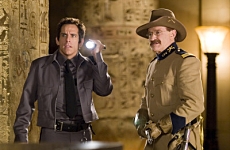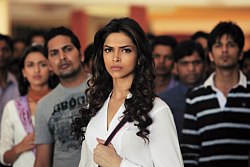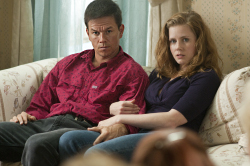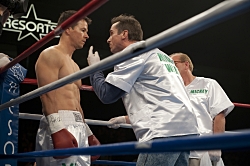Interview with Ben Stiller (Larry Daley)
Stiller is an innovative comedian and skilled actor, but still found the film to be challenging, mostly because of the special effects involved, which entailed working in a completely different way, often without other actors to react to during intense action scenes.
Popular on LondonNet
The actor grew up steeped in show business as the son of comedians, Jerry Stiller and Anne Meara. He began making Super 8 films when he was 10 years old and made his professional stage debut in 1985 on Broadway, starring in John Guare’s THE HOUSE OF BLUE LEAVES. In 1987 he appeared in Steven Spielberg’s EMPIRE OF THE SUN. He created and wrote THE BEN STILLER SHOW for MTV, then directed his first hit movie, REALTY BITES in 1994.
Stiller is an accomplished and innovative actor, director, producer and writer. He co-wrote, produced and starred in ZOOLANDER in 2001. His films include: FLIRTING WITH DISASTER, THE CABLE GUY, THERE’S SOMETHING ABOUT MARY, MEET THE PARENTS, MEET THE FOCKERS, KEEPING THE FAITH, STARSKY AND HUTCH and THE ROYAL TENNENBAUMS. He was the voice of Alex the lion in the animated film, MADAGASCAR.
Stiller, 40, is married to actress Christine Taylor and they have two children, Ella 4 and one year-old Quinlin.
His upcoming films include Jay Roach’s USED GUYS with Jim Carrey, SEVEN DAY ITCH directed by The Farrelly brothers and THE PERSUADERS, a remake of the British TV series, with Steve Coogan.
The following interview was conducted in Los Angeles
Did you go to museums on a regular basis growing up in New York?
I grew up three or four blocks away from the Museum of Natural History, I started going there as a really young boy and it was always fun. Of course growing up in New York there were many museums I would go to: The Metropolitan Museum of Art, the Museum of Modern Art and The Whitney Museum of American Art, but the Natural History Museum was special for me because it had cool dioramas and it was so interesting. The aura inside was wonderful – a great dark hall with light coming from the dioramas, it was a great spooky place that you could get lost in, it seemed timeless. And I had such great memories of it, growing up. When I didn’t go to school some days (I ‘cut school’) it was a place that I could disappear into, so it really had a history for me.
So was it exciting when you heard that this film was being made?
When I got the call about the script and then read it, I was very excited because it seemed like such a great idea, I thought it sounded cool and fun. I thought the idea was incredibly original. I thought it was fascinating too, the idea of all the historical exhibits and creatures coming to life. It really connected to me, because of my love for the Natural History Museum as a child. I thought if I was a kid, I would want to see this movie and if I was older – which I am – the kid in me would want to see it. So it would appeal to every age group. I thought that it had a lot of possibilities.
Having children of your own must make the film even more appealing for you?
Definitely, having kids of my own now brings it all back to me, the fun I had at the museum. Going back with them to the museum and making this film, you get to experience it again through their eyes which is great and it takes me back to my childhood. I have been taking my daughter back to the museum for the last couple of years and loving it.
What kind of man is your character Larry Daley?
He’s a guy who just hasn’t put everything together in his life very well.
His life has not been working for him and he is trying to get back on track. He has a lot of schemes and plans. He is ambitious, an entrepreneurial kind of guy, who wants to get to the finish line without doing all the work. He has big dreams of being successful, but he has never managed to follow through with things. He tends to give up when the going gets tough. The irony is that he thinks he is taking a dead end job that is leading nowhere. Actually though, his job at the museum ends up being a positive experience, that results in him getting closer to his son and getting his son back in his life. The metaphor of the movie is that you have to stick to something to be successful and I like that. I think it is something that that we can all relate to. It is also about a dad trying to have a connection with his son.
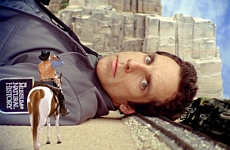 As a father yourself, did you understand the plight of a man who did not want to disappoint his son?
As a father yourself, did you understand the plight of a man who did not want to disappoint his son?
Of course, because you want your children to look up to you and respect you. You do not want to let them down. Any parent will tell you that. And that can be really frustrating and difficult sometimes, when you have to deal with the realities of life and things that you cannot control. My kids are pretty young, aged four and one, but yes, the bottom line is that you want to be good parents and I can identify with Larry in that way. I have been lucky that I have always had steady work (unlike the character I play) and I have been able to take care of the family on that level. Men place a lot of importance on achievement in the world and their identity is tied up with their sense of success. That is just natural human nature.
So what happens to your character?
In the movie, Larry realizes that all his dreams and ambitions have not been fulfilled, so he has to swallow his pride and say: ‘ok I have to get a real job’. He has to face reality and he thinks that becoming a security guard is the most embarrassing thing that he could do. He does not want to tell his son that is the job he has taken, because he has grander dreams for himself. But the job ends up being an experience that he has to walk through. It is a daunting task for him; it is almost something that he wants to walk away from. But he keeps going and eventually he is able to feel good about himself and win his son’s respect.
Have you ever been in the position in which you thought you were going nowhere? Looking at your career, it appears that everything has gone well from the start?
I feel like when I started out in this business there was a lot of rejection. I had to keep on going and keep trying despite the disappointment and continue doing my best. I had to do this in the face of a lot of apathy and when you are rejected you have to believe in yourself. You have nothing else to rely on. Sometimes, looking back on those times I think ‘wow what was I thinking?’ Most of the time when I look back at work I did 20 years ago, I see someone who is a lot more confident, I looked as I though I knew what I was doing. I thought I knew it all in some ways. Now I think I know much less, but that kind of bravado is really the kind of confidence that you have to have when you are starting out in a career. You have to have blind faith that you will succeed; I don’t think it is a conscious thing. It is what you need if you are going to endure all the obstacles that will face you, if you are going to be a working actor, because of course there are never any guarantees of success.
Did you have a low point in your career?
I have been really fortunate that I haven’t been out on the street or destitute, there haven’t been really bad times. There are a lot of stories about actors who have lived hand to mouth. But I was lucky enough to be raised in New York City and my parents were very supportive. I also started getting work when I was twenty years old and I was able to support myself. There have been difficult times. But it is during those uncomfortable times, that you become most creative, when things are not going the way you want them to. Those experiences make you a better actor or a better writer. But I am also lucky that that I had a fortunate life in terms of having a great family, coming from loving parents.
How much improvisation was there on the film?
There’s definitely been a lot of improvisation on this movie. You have to have a really well written scene to begin with, but then with a comedy like this, you can go off the script if it feels good and it feels funny. That is how the process works. You say to yourself: how can I make this better? Shall I try something different?’ When you are shooting a movie, it is good to try as many options as you can. But as much as you try to think ahead and try to be funny, when you get in front of a big audience with the final film, you never know when people will laugh. Sometimes they laugh when you least expect them to.
What is your character’s relationship to Teddy Roosevelt, played by Robin Williams?
I love my character’s relationship to Roosevelt, he is the guy inspiring me and telling me that I have to stick with it and keep on going. He teaches me a lot. And it was fantastic working with Robin.
Was it fun having Owen Wilson in the film, you two are friends and work together a lot? This time he has a small part as a three-inch tall cowboy!
Owen always makes me laugh. I love working with him because I’ve always been a fan so it’s great to have him in the film. I really do think he is one of the funniest guys I know. There is something fascinating about his sensibilities and the way his mind works, that is great. In his comedy, he has that mix of being very cocky and also really insecure and he has a vulnerability which is endearing and we just laugh at the same things. I feel that I identify with him, I don’t know why. This time I didn’t really get to work with him much, because he was one of those little people who come out of the diorama, but that meant I could talk down to him which was nice. I enjoyed it. (laughs)
How enjoyable was it to work with Dick Van Dyke and Mickey Rooney?
It was really as good as it could be. It was so exciting to come to work with those guys, it makes you want to show up to work on time and know your lines and be as good as you can be, because they are setting such a good example. They are so good and vibrant. So many people don’t understand their history and where they come from but for me it was really humbling. People sometimes say: ‘ you do not want to work with your idols because you see the reality of what they are like as human beings’. But both of those guys are just incredible people and have lived really amazing lives and they have been through the whole cycle of show business, which is something that I really respect. They are inspiring because they have had their ups and downs and they’ve survived. They are living legends. Dick Van Dyke has had a great screen and TV career, he is iconic, but when you work with him, you find that he is a really cool guy. He is very connected to what is going on today, he is 80- years old, he moves so well and he’s a great dancer. Mickey Rooney is Mickey Rooney – it goes without saying. He will tell you stories about going to the preview of THE WIZARD OF OZ with Judy Garland and how Henry Ford gave him the first Lincoln Continental (car). Ford drove up to the set of CAPTAINS CORAGEOUS and gave him the keys and Clark Gable took it for a spin. It is fascinating. If it were anybody else talking, you would say: ‘you’re crazy you’re making this up,’ but with Mickey Rooney it is true, he has lived an amazing life. He’s really funny and talented.
 What is the challenge for you of making a comedy like this?
What is the challenge for you of making a comedy like this?
The challenge is to create a tone that works on a creative and a comedic level, but also to create the different tones. Apart from the humor, there is an interesting scary level to the movie, the idea of creatures coming to life at night. And there is a really good, strong story about a father trying to make his son proud of him. He knows that at least he needs to have a job and a home so he can hang out with his son and be a real father with security. So he has to take the worst possible job. I do like the idea that this film is a fantasy that is grounded in reality.
The challenges must also be very physical, with all the special effects. That means working on your own a lot of the time, for example with a non-existent, CG dinosaur?
It is challenging because I have never done anything like this before, with so many special effects. The technical demands are quite daunting to start with. A lot of time there is nothing there when you are acting, because you are acting opposite museum exhibits and characters. I can look at Shawn, (the director) which helps. It is easier to react to a real person and it was always helpful working with Shawn for that reason. But at the end of the day you have to commit to making it work.
Did you use any special techniques in your acting to make it work?
Working in this way involved connecting to the reality of a world that is fantastical. But you have to make real, even though it doesn’t exist until you finally see the completed movie, until it is cut together. So when you are reacting to a non existent dinosaur and there is nothing in front of you – you do feel stupid a lot of the time. Imagine acting and doing complicated choreography opposite a dinosaur that is never there. They animate the entire dinosaur in later. You have to trust that it is all going to be cut together in the right way. It is hard, because you have focus so much more than when you are acting with a person who is giving you energy. So when I was acting in a scene with a real person, it was a relief because I could relax and bounce off a real actor. But when I was in a scene with a dinosaur, I had to imagine a really frightening animal that would scare you and you have to effectively create your own energy. When I was acting with the miniature people who have jumped out of their displays, I was literally having real conversations talking to matchsticks and you feel quite ridiculous. The good thing is that is that it forces you to throw away all your inhibitions and just go for it and it focuses you. You have to stay in the moment.
What has been your greatest challenge as an actor?
You are challenged any time you do anything creatively. The challenge is feeling free enough to take a chance to go out and be good, be bad or whatever, to just do it and be in front of the camera and try to be real and funny. It is a weird process and if you think about it too much it can be paralyzing, so I think that is what every actor’s challenge is, to just try to do the best you can and it’s not easy.
What did you like most in the Natural History Museum when you visited as a child?
I always loved the planetarium because of the magical weird moonscapes. And I also loved the dioramas form the 1600s, particularly the one depicting the Indians and the pilgrims bartering for Manhattan. I always loved that diorama, because Manhattan is of course full of tall buildings now, but it once it was a patch of land and I find that so fascinating. I love history and that was all special for me because I grew up there. I enjoyed going to the museum even though I wasn’t a brilliant student. Actually, I don’t think I would be here talking to you if I had been a great student. (laughs)
Where do you find most contentment in your life these days?
The best way of being, is to simply be happy in the moment, wherever you are. For me there is nothing better than being with the family. But I love my work and I like to have balance in life, which entails being with the family and being creative and having fun at the same time. I am happiest when the balance is just right.


